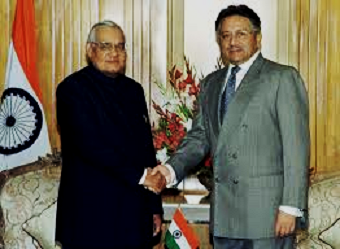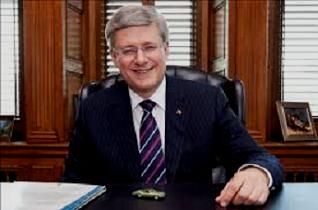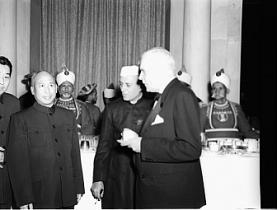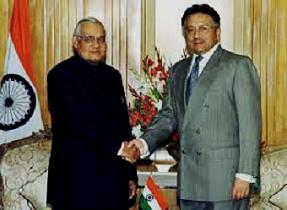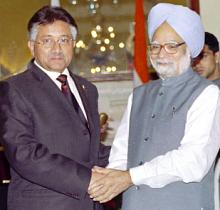Canada backs Kashmir solution
The Hindu reported (November 24, 2014), that Mr Brad Wall Premier of Canada´s Saskatchewan Province on his recent visit to India indicated that his province is discussing sale of Uranium to India and hoped to strike the deal in the near future. Some political circles in India believe that it is perhaps an arm twisting exercise rather than a straight forward business deal. India, in the discussion held, showed concern about the activities of pro Khalistan elements widespread in Canada. Regarding Kashmir Foreign Minister Baird, however, stressed that stability with Pakistan and Kashmir region must be a priority and Kashmir problem needs to be solved bilaterally between the two countries.
The official Canadian stand on Kashmir widely misunderstood in India provides to maintain an attitude of defiance brazenly ignoring the ground realities. The powers which matter on international level consider Kashmir as a nuclear flashpoint putting at risk security of the world with devastating consequences. A good gesture offered to endeavour towards finding an amicable solution for Kashmir is taken as a weakness rather than a constructive disposition to save a foreseeable precarious and catastrophic outcome.
The new developing Canada –India economic relations saw removal of penalties imposed on India in seventies when Canadian uranium offered for peaceful purposes was used in an Indian nuclear weapons test in breach of the agreement signed between the two countries. Historically the government of Canada takes peaceful resolution of Kashmir seriously and hopes that India, Pakistan and people of Kashmir sit across the table and thrash out a solution acceptable to all sides especially people of Kashmir. Prime Minister Louis Stephen St-Laurent of Canada (1948-57) supported the Kashmir cause with wish of the people of Kashmir to be paramount, ascertained and supervised by United Nations.
Canadian General Andrew McNaughton backed a proposal of UN Security Council, in the Resolutions adopted on August 13, 1948 and January 5, 1949. McNaughton´s proposals contemplated "an agreed program of progressive demilitarization ... on either side of the cease-fire line to withdrawal, disbandment and disarmament in such stages as not to cause fear at any point; both governments expected to reach agreement by 31 January 1950 on progressive steps taken in reducing and redistributing the forces to the minimum level complete with the maintenance of security and of local law and order".
India turned a deaf ear to all these efforts made on international level. General McNaughton´s proposal in essence, in the recent past, was discussed and nearly accepted as a solution to the problem between Indian Prime Minister AB Vajpayee and Pakistani President Pervez Musharraf but again Indian backtracking at the last moment pushed it back to square one.
Through the backchannel diplomacy Indian Prime Minister Manmohan Singh and Pakistan President Pervez Musharraf had reached an understanding for a solution to Kashmir problem, reported Times of India on September 03, 2011. Mr Singh had confirmed this to a visiting US delegation led by Foreign Affairs Committee chairman Howard Berman saying the solution included free trade and movement across LoC. Again change in the government in Pakistan, the process got stalled and the genuine effort came to a halt.
Krishnadev Calamur in an article published in npr.org titled "From Quebec to Kashmir" (September 17, 2014) writes "Twenty-five years of separatist insurgency in Indian-administered Kashmir, and the Indian response to it, has claimed tens of thousands of lives. They have also created a climate where people are often reluctant to say what they really feel. Kashmir has been the scene of pro-independence movement for decades and a heavy military presence has kept a lid on the rebellion". On Scotland´s recently held referendum Calamur writes that "it could resonate far beyond the borders of the United Kingdom as there are many places with separatist movements battling for independence".
South Asian News Agency (SANA) reported (November 18, 2012) Canadian Foreign Minister John Baird stating Canada´s official position on Kashmir saying "Ottawa takes the issue of a peaceful solution to the dispute seriously and continues to monitor the situation in Kashmir". Prime Minister Stephen Harper also regards the unresolved issue and intensification of systematic human rights violations against civilians in Kashmir as a matter of utmost concern.
Kashmir is keeping its fingers crossed and watches the development of new Canada-India relationship to see how it affects Canada’s previous unstinting support for Kashmir. Kashmir back on the international agenda, a sensible constructive approach on the part of India and Pakistan is need of the time to find a peaceful solution as per the wish of people of Kashmir. The ongoing election drama played in Kashmir under the barrel of gun is not helping anyone and on the contrary adds fuel to the fire destabilising the whole region with consequences unprecedented.
Comments
There are 0 comments on this post






